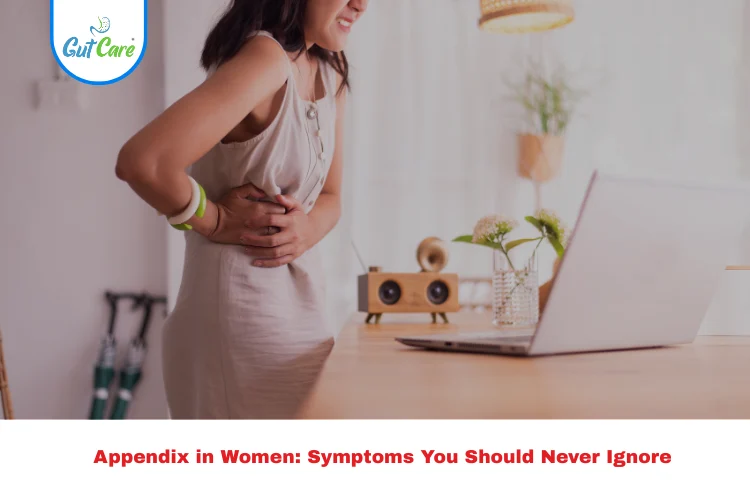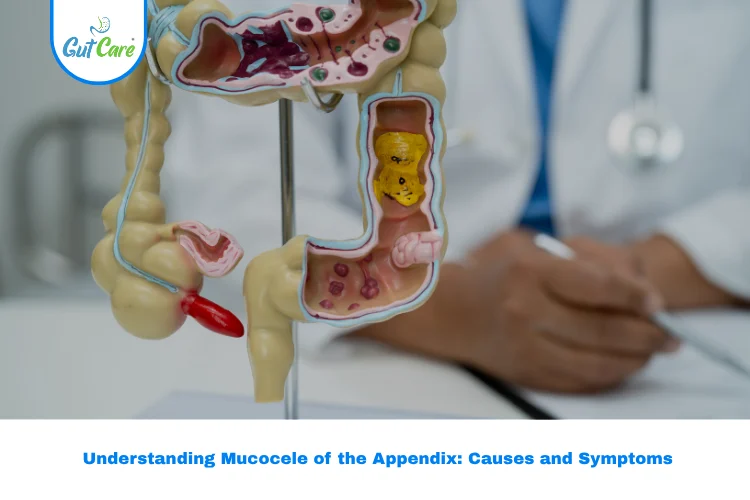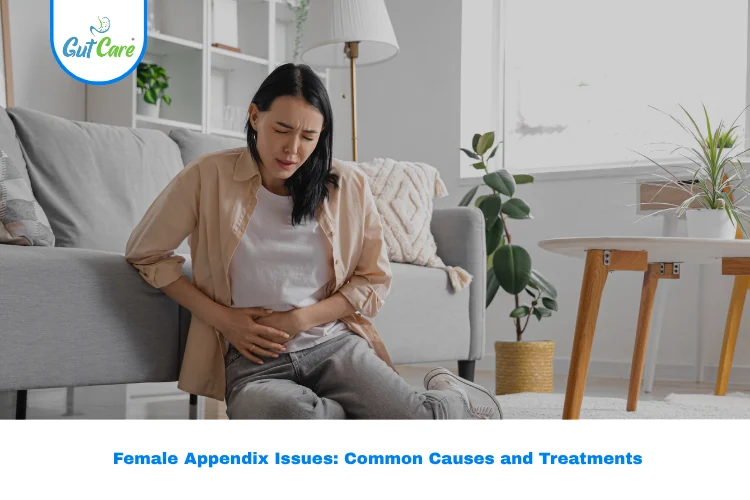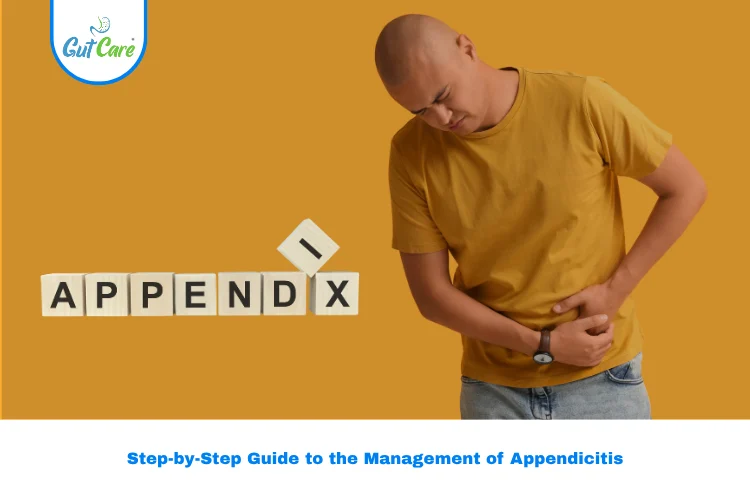The appendix in women can be a silent troublemaker. Its symptoms often resemble those of gynecological conditions such as ovarian cysts, endometriosis, or even menstrual cramps, leading to delays in proper treatment. At Gutcare Clinics in Bangalore, Dr. Yuvrajsingh Gehlot has treated many women whose appendix issues were initially mistaken for other health problems.
Understanding the symptoms, knowing simple home remedies for mild digestive discomfort, and recognizing when to seek urgent care can help you act fast — and possibly save your life.
Why Appendix Symptoms Are Often Missed in Women
The appendix in women lies near the reproductive organs and urinary tract. This close proximity often causes symptoms to overlap with:
- Pelvic Inflammatory Disease (PID)
- Ovarian cyst rupture or torsion
- Urinary Tract Infection (UTI)
- Endometriosis flare-ups
Because of these overlaps, women often receive treatment for unrelated issues first, delaying the correct diagnosis of appendicitis.
Common Symptoms of Appendix in Women
1. Gradual Pain Shift
- Description: Pain starts as a dull ache near the belly button and moves to the lower right abdomen over a few hours.
- Why It Happens: Inflammation spreads from the appendix lining to the abdominal wall.
- Common Misdiagnosis: Menstrual cramps or ovulation pain.
2. Increased Pain with Movement
- Description: Walking, coughing, sneezing, or pressing the abdomen worsens the pain.
- Reason: The inflamed appendix irritates the abdominal lining.
3. Loss of Appetite
- Description: A sudden, unexplained drop in hunger, often before nausea starts.
- Reason: Digestive inflammation disrupts appetite regulation.
4. Nausea and Vomiting
- Description: Queasiness or vomiting after pain begins.
- Reason: The brain responds to abdominal inflammation with nausea signals.
- Misdiagnosis Risk: Food poisoning or early pregnancy.
5. Low-Grade Fever
- Description: Fever between 37.5°C to 38°C (99.5°F to 100.4°F).
- Reason: The immune system fights infection.
- Warning: A sudden temperature spike could mean a ruptured appendix.
6. Abdominal Bloating and Gas Retention
- Description: Feeling unusually full or unable to pass gas.
- Reason: Temporary paralysis of bowel movement from inflammation.
7. Changes in Bowel Habits
- Description: Mild diarrhea or constipation.
- Reason: Irritation of nearby intestines.
8. Pelvic Pain in Women
- Description: Pain radiates toward the pelvic area instead of the right abdomen.
- Reason: The appendix’s location near reproductive organs.
- Misdiagnosis Risk: Endometriosis, PID, or UTI.
Home Remedies for Mild Digestive Discomfort (Not a Cure for Appendicitis)
These remedies may help with mild digestive discomfort but will not cure appendicitis. They should only be used while awaiting medical evaluation — not as a replacement for professional care.
1. Warm Compress
- Benefit: Relaxes muscles and may ease cramping.
- Use: Place a warm (not hot) water bag on the abdomen for 10–15 minutes.
- Precaution: Avoid if inflammation or infection is suspected.
2. Ginger Tea
- Benefit: Anti-inflammatory, reduces nausea.
- Use: Boil fresh ginger slices for 5 minutes, strain, drink warm.
- Precaution: Avoid excess if pregnant or with gallstones.
3. Turmeric Milk
- Benefit: Anti-inflammatory and immune-boosting.
- Use: Mix ½ teaspoon turmeric in warm milk once daily.
- Precaution: Avoid if on blood thinners or with gallstones.
4. Peppermint Tea
- Benefit: Relieves bloating and mild digestive discomfort.
- Use: Steep peppermint leaves for 5–7 minutes, drink warm.
- Precaution: Avoid if prone to acid reflux.
5. Adequate Hydration
- Benefit: Supports digestion and toxin removal.
- Use: Drink 8–10 glasses of water daily.
- Precaution: Limit sugary and carbonated drinks.
When to See a Doctor Immediately
Seek urgent care if you experience:
- Sudden worsening of abdominal pain
- Pain that shifts from belly button to lower right side
- Persistent vomiting
- High fever
- Inability to pass gas or severe bloating
A ruptured appendix is a life-threatening emergency. Visit Gutcare Clinics in Bangalore and consult Dr. Yuvrajsingh Gehlot for accurate diagnosis and treatment.
Summary
The appendix in women can be tricky to diagnose because its symptoms mimic other abdominal or pelvic issues. While home remedies like warm compresses, ginger tea, turmeric milk, peppermint tea, and hydration can ease mild discomfort, they cannot cure appendicitis.
For any severe, persistent, or worsening pain, visit Gutcare Clinics in Bangalore to consult Dr. Yuvrajsingh Gehlot. Timely diagnosis and treatment can prevent serious complications.
FAQs
1. What are early signs of appendix in women?
Pain near the belly button that shifts to the lower right abdomen, nausea, loss of appetite, and mild fever are early warning signs.
2. Can appendix pain in women feel like menstrual cramps?
Yes. The appendix in women is located near the reproductive organs, making pain similar to menstrual or ovarian discomfort.
3. What home remedies can help with appendix pain?
Ginger tea, warm compresses, turmeric milk, peppermint tea, and good hydration can ease mild digestive symptoms but won’t treat appendicitis.
4. When should I visit Gutcare Clinics for appendix-related pain?
If you have severe abdominal pain, vomiting, or fever, visit Gutcare Clinics in Bangalore to see Dr. Yuvrajsingh Gehlot immediately.
5. Can appendix symptoms go away on their own?
Mild discomfort might pass temporarily, but appendicitis won’t heal without treatment. Ignoring symptoms risks a dangerous rupture.




